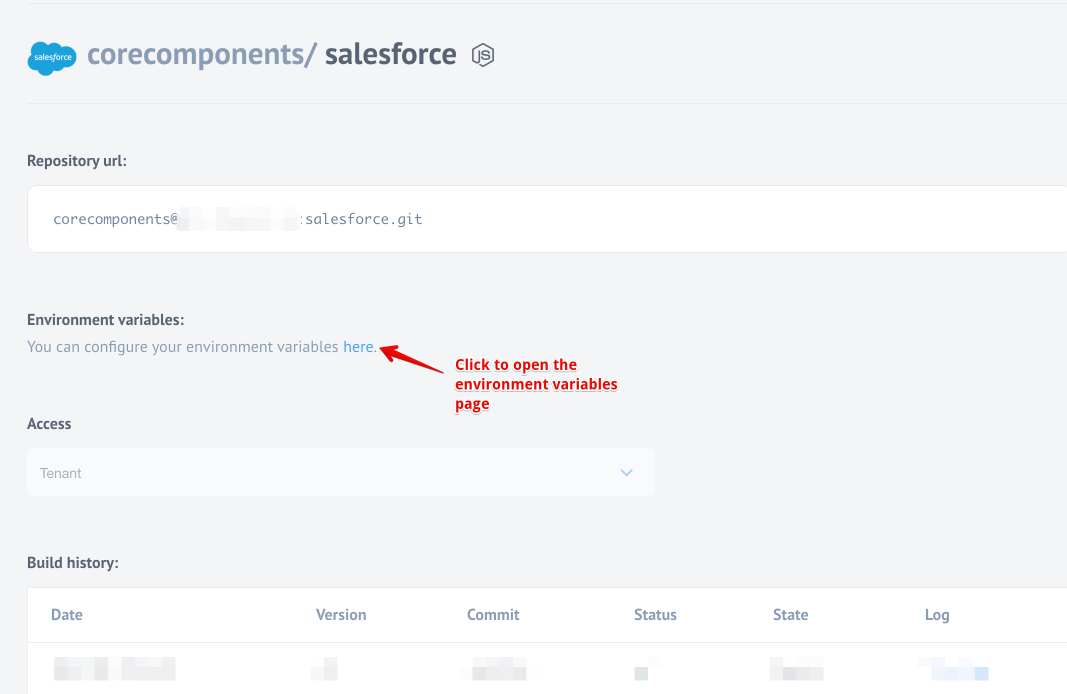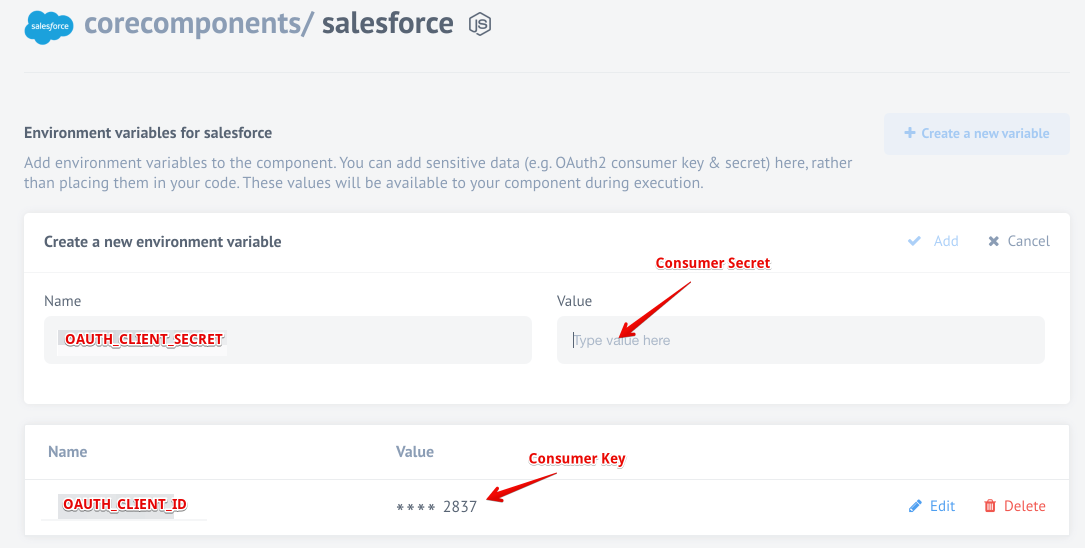Deprecated Salesforce functions
Deprecated authentication method
Credentials
During credentials creation you would need to:
-
Choose
Environment -
Enter
UsernameandPasswordin a pop-up window after click onAuthenticatebutton. -
Verify and save your new credentials.
Note: When you deploy the Salesforce component separately into a dedicated tenant or into your developer team it can not use the OAuth App specifically created for our main elastic.io tenant. For this purposes you must create a different OAuth App and add the required environment variables to the component setup.
Authentication
Authentication occurs via OAuth 2.0.
In the component repository you need to specify OAuth Client credentials as environment variables:
-
OAUTH_CLIENT_ID- your OAuth client key -
OAUTH_CLIENT_SECRET- your OAuth client secret
Note: We renamed the environment variables
SALESFORCE_KEYandSALESFORCE_SECRETto standardize the OAuth workflow. To get these values you can check the creating OAuth App for Salesforce article.
Auth client creation
Here is where those two keys fit into the picture. After the deployment, your repository looks like this.

Click You can configure environment variables here link to configure variables for this specific component.

You would need to create two variables here:
OAUTH_CLIENT_ID- your OAuth client key, meaning the Consumer Key.OAUTH_CLIENT_SECRET- your OAuth client secret, meaning the Consumer Secret.
Please Note: We renamed the environment variables
SALESFORCE_KEYandSALESFORCE_SECRETto standardize the OAuth workflow.
Deprecated Triggers
New Case trigger(deprecated)
Polls existing and updated Cases (fetches a maximum of 1000 objects per execution)
Trigger is deprecated. You can use Get Updated Objects Polling trigger instead.
New Lead trigger(deprecated)
Polls existing and updated Leads (fetches a maximum of 1000 objects per execution)
Trigger is deprecated. You can use Get Updated Objects Polling trigger instead.
New Contact trigger(deprecated)
Polls existing and updated Contacts (fetches a maximum of 1000 objects per execution)
Trigger is deprecated. You can use Get Updated Objects Polling trigger instead.
New Account trigger(deprecated)
Polls existing and updated Accounts (fetches a maximum of 1000 objects per execution)
Trigger is deprecated. You can use Get Updated Objects Polling trigger instead.
New Task trigger(deprecated)
Polls existing and updated Tasks (fetches a maximum of 1000 objects per execution)
Trigger is deprecated. You can use Get Updated Objects Polling trigger instead.
Get New and Updated Objects Polling trigger(Deprecated)
Polls existing and updated objects. You can select any custom or built-in object for your Salesforce instance.
This trigger is deprecated. Please use Get Updated Objects Pollingtrigger instead.
Deprecated Actions
Lookup Object action(deprecated)
Lookup an object by a selected field.
Action creates a single object. Input metadata is fetched dynamically from your Salesforce account. Output metadata is the same as input metadata, so you may expect all fields that you mapped as input to be returned as output.
Input field description
- Optional batch size - A positive integer specifying batch size. If no batch size is specified then results of the query will be emitted one-by-one, otherwise, query results will be emitted in an array of maximum batch size.
- Object - Input field where you should choose the object type, which you want to find. E.g.
Account - Lookup field - Input field where you should choose the lookup field which you want to use for result filtering. E.g.
Id. - Max Fetch Count - limit for a number of messages that can be fetched. 1,000 is the default value when the variable is not set.
For now, you can specify all unique, lookup, ExternalID/Id fields.
Execution result handling
| Condition | Execution result |
|---|---|
| Lookup failed - we were not able to find any parent object. | Lookup action emits a single message with an empty body. |
| Lookup found a single object, e.g. we were able to identify a parent Account to the Contact | A single message will be emitted, found object will be a body of the message |
| Lookup found multiple objects (that may happen when a lookup is made by non-unique field) | Each found object will be emitted with the separate message |
Action is deprecated. You can use Lookup Object action or Lookup Object action (at most 1) instead.
New Account action(deprecated)
Creates a new Account. Action creates a single object. Input metadata is fetched dynamically from your Salesforce account. Output metadata is the same as input metadata, so you may expect all fields that you mapped as input to be returned as output.
Input fields description
This action will automatically retrieve all existing fields of Account object type that available on your Salesforce organization.
Action is deprecated. You can use Create Object action instead.
New Case action(deprecated)
Creates a new Case.
Action creates a single object. Input metadata is fetched dynamically from your Salesforce account. Output metadata is the same as input metadata, so you may expect all fields that you mapped as input to be returned as output.
Input fields description
This action will automatically retrieve all existing fields of Case object type that available on your Salesforce organization
Action is deprecated. You can use Create Object action instead.
New Contact action(deprecated)
Creates a new Contact.
Action creates a single object. Input metadata is fetched dynamically from your Salesforce account. Output metadata is the same as input metadata, so you may expect all fields that you mapped as input to be returned as output.
Input fields description
This action will automatically retrieve all existing fields of Contact object type that available on your Salesforce organization
Action is deprecated. You can use Create Object action instead.
New Event action(deprecated)
Creates a new Event.
Action creates a single object. Input metadata is fetched dynamically from your Salesforce account. Output metadata is the same as input metadata, so you may expect all fields that you mapped as input to be returned as output.
Input fields description
This action will automatically retrieve all existing fields of Event object type that available on your Salesforce organization
Action is deprecated. You can use Create Object action instead.
New Lead action(deprecated)
Creates a new Lead.
Action creates a single object. Input metadata is fetched dynamically from your Salesforce account. Output metadata is the same as input metadata, so you may expect all fields that you mapped as input to be returned as output.
Input fields description
This action will automatically retrieve all existing fields of Lead object type that available on your Salesforce organization
Action is deprecated. You can use Create Object action instead.
New Note action(deprecated)
Creates a new Note.
Action creates a single object. Input metadata is fetched dynamically from your Salesforce account. Output metadata is the same as input metadata, so you may expect all fields that you mapped as input to be returned as output.
Input fields description
This action will automatically retrieve all existing fields of Note object type that available on your Salesforce organization
Action is deprecated. You can use Create Object action instead.
New Task action(deprecated)
Creates a new Task.
Action creates a single object. Input metadata is fetched dynamically from your Salesforce account. Output metadata is the same as input metadata, so you may expect all fields that you mapped as input to be returned as output.
Input fields description
This action will automatically retrieve all existing fields of Task object type that available on your Salesforce organization
Action is deprecated. You can use Create Object actions instead.
Click here to learn more about the elastic.io iPaaS